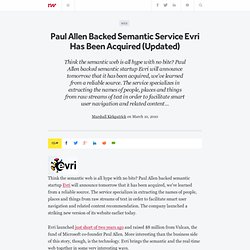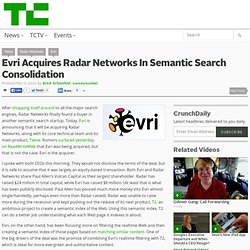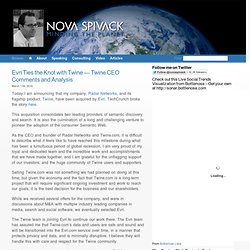

The first to know. Think the semantic web is all hype with no bite?

Paul Allen backed semantic startup Evri will announce tomorrow that it has been acquired, we've learned from a reliable source. The service specializes in extracting the names of people, places and things from raw streams of text in order to facilitate smart user navigation and related content recommendation. The company launched a striking new version of its website earlier today. Evri launched just short of two years ago and raised $8 million from Vulcan, the fund of Microsoft co-founder Paul Allen. More interesting than the business side of this story, though, is the technology. Update: According to new reports this morning, Evri wasn't acquired. We profiled Evri as one of 10 intriguing companies in the real-time web space in our recent research report The Real-Time Web and Its Future.
Here's how we described the real time part of what Evri does in that report: Evri is a semantic Web recommendation service for online publishers. TCh coverage. After shopping itself around to all the major search engines, Radar Networks finally found a buyer in another semantic search startup.

Today, Evri is announcing that it will be acquiring Radar Networks, along with its core technical team and its main product, Twine. Rumors surfaced yesterday on ReadWriteWeb that Evri was being acquired, but that is not the case. Evri is the acquirer. I spoke with both CEOs this morning. They would not disclose the terms of the deal, but it is safe to assume that it was largely an equity-based transaction. Evri, on the other hand, has been focusing more on filtering the realtime Web and then creating a semantic index of those pages based on matching similar content. “We had to find a home,” explains Radar CEO Nova Spivack. Semantic search is still in its infancy. CEO blog post. Today I am announcing that my company, Radar Networks, and its flagship product, Twine, have been acquired by Evri.

TechCrunch broke the story here. This acquisition consolidates two leading providers of semantic discovery and search. It is also the culmination of a long and challenging venture to pioneer the adoption of the consumer Semantic Web. As the CEO and founder of Radar Networks and Twine.com, it is difficult to describe what it feels like to have reached this milestone during what has been a tumultuous period of global recession.
I am very proud of my loyal and dedicated team and the incredible work and accomplishments that we have made together, and I am grateful for the unflagging support of our investors, and the huge community of Twine users and supporters. While we received several offers for the company, and were in discussions about M&A with multiple industry leading companies in media, search and social software, we eventually selected Evri. What I’m Doing Next Deborah L. A bit of history... Yesterday, Bing released a surprisingly useful new feature around recipe search.

If you search for “Chicken,” you can narrow the results down by “chicken recipes” and then a whole bunch of new filtering options appear down the left-hand column. You can further narrow results by recipe rating, cuisine (vegetarian, Spanish, Southwestern), convenience (quick/easy, family, entertaining), occasion (wedding, Valentine’s Day), main ingredient, course, or cooking method. Bing is big on guided search (showing relevant search categories to help narrow results), but this goes one step further towards semantic search (the ability to index and search the Web by different facets).
Recipes are just the beginning, and it’s not just Bing. Google and a handful of startups, including Evri, Hakia, and Radar Networks, are hard at work on making semantic search a reality. In fact, Bing’s recipe search looks a hell of a lot like T2, the semantic search engine being developed in private by Radar Networks.